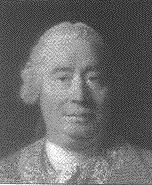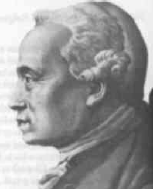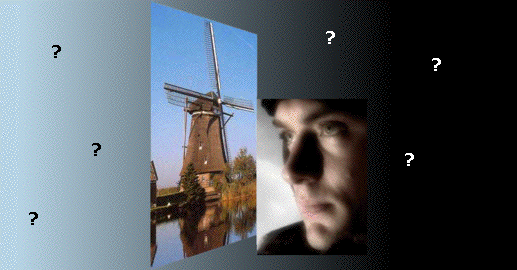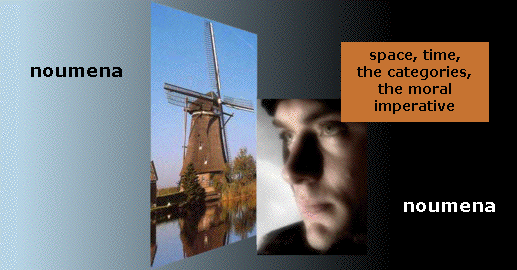 |
Dr. C. George Boeree
|
 |
 |
Dr. C. George Boeree
|
 |
The 1700s saw many great thinkers who have left a lasting impact on modern philosophy and science -- and psychology. But there were two who would, between them, define the nature of science, especially psychology. They are, of course, David Hume and Immanuel Kant.
DAVID HUME
David Hume was born April 26, 1711 in Edinburgh, Scotland. His father died the following year and left the estate to his eldest son, John. John ensured that David would receive a good Presbyterian upbringing and sent him -- at the age of 12 -- to the University of Edinburgh. David left three years later, to become a philosopher!
His family suggested he try law, and he tried, but found that it -- as he put it -- made him sick. So he went off to travel a few years in England and France. It was at a Jesuit College in France that he wrote A Treatise of Human Nature (in two parts), which he published anonymously in London in 1739.
Hume was the ultimate skeptic, convincingly reducing matter,
mind, religion, and science to a matter of sense impressions and
memories.
First, he agreed with Bishop Berkeley that matter, or the existence of
a world beyond our perceptions, is an unsupportable concept. Further,
cause
and effect were likewise unsupportable. We see sequences of
events,
but can never see the necessity that determinism requires.
Further
still, his investigations led him to dismiss the existence of a
unifying
mind within us. What we call mind is just a collection of mental
perceptions. And finally, without mind, there can be no free
will.

I will let him speak for himself. Pay close attention to some really good arguments!
All ideas are copies of impressions...it is impossible for us to think of anything which we have not antecedently felt by our senses....And so...no matter!When we entertain any suspicion in a philosophical term, we need but inquire from what impression is that supposed idea derived. If it be not possible to assign any, this will serve to confirm our suspicion that it is employed without meaning....
Some philosophers found much of their reasonings on the distinction of substance and quality. I would fain ask them whether the idea of substance be derived from impressions of sensations or impressions of reflection. Does it arise from an impression? Point it out to us, that we may know its nature and qualities. But if you cannot point out any such impression, you may be certain you are mistaken when you imagine you have any such idea.
The idea of substance is nothing but a collection of ideas of qualities, united by the imagination and given a particular name by which we are able to recall that collection. The particular qualities which form a substance are commonly referred to an unknown something in which they are supposed to "inhere." This is a fiction.
There are some philosophers (e.g. Berkeley) who imagine we are every moment intimately conscious of what we call our self; that we feel its existence and its continuance in existence, and are certain of its identity and simplicity.And no mind!For my part, when I enter most intimately into what I call my self, I always stumble on some particular perception or other, of heat or cold, light or shade, love or hatred, pain or pleasure, color or sound, etc. I never catch my self, distinct from some such perception.
I may venture to affirm of the rest of mankind that they are nothing but a bundle or collections of different perceptions which succeed each other with an inconceivable rapidity and are in a perpetual flux and movement. Our eyes cannot turn in their sockets without varying their perceptions. Our thoughts are still more variable. And all our other senses and powers contribute to this change.
The mind (or self) is a kind of theatre where perceptions make their appearances, pass, repass, glide away, and mingle in an infinite variety. But there is no simplicity, no one simple thing present or pervading this multiplicity; no identity pervading this process of change; whatever natural inclination we may have to imagine that there is. The comparison of the theatre must not mislead us: it persists, while the actors come and go. Whereas, only the successive perceptions consititute the mind.
As memory alone acquaints us with the continuance and extent of a succession of perceptions, it is to be considered, on that account chiefly, as the source of personal identity. Had we no memory, we should never have any notion of that succession of perceptions which constitutes our self or person. But having once acquired this notion from the operation of memory, we can extend the same beyond our memory and come to include times which we have entirely forgot. And so arises the fiction of person and personal identity.
There is no idea in metaphysics more obscure or uncertain than necessary connection between cause and effect. We shall try to fix the precise meaning of this term by producing the impression from which it is copied. When we look at external objects, and consider the operation of causes, we are never able, in a single instance, to discover a necessary connection; any quality which binds the effect to the cause, and renders one a necessary consequence of the other. We find only that the effect does, in fact, follow the cause. The impact of one billiard ball upon another is followed by the motion of the second. There is here contiguity in space and time, but nothing to suggest necessary connection.Out with cause and effect!Why do we imagine a necessary connection? From observing many constant conjunctions? But what is there in a number of instances which is absent from a single instance? Only this: After a repetition of similar instances the mind is carried by habit, upon the appearance of the cause, to expect the effect. This connection, which we feel in the mind, this customary and habitual transition of the imagination from a cause to its effect, is the impression from which we form the idea of necessary connection. There is nothing further in the case.
The most irregular and unexpected resolutions of men may be accounted for by those who know every particular circumstance of their character and situation. A genial person, contrary to expectation, may give a peevish answer, but he has a toothache or has not dined. Even when, as sometimes happens, an action cannot be accounted for, do we not put it down to our ignorance of relevant details?Free will is only our ignorance of cause and effect, and cause and effect is an illusion, so free will is an illusion. Simple.Thus it appears that the conjunction between motive and action is as regular and uniform as between cause and effect in any part of nature. In both cases, constant conjunction and inference from one to the other.
In all reasonings from experience, then, there is a step taken by the mind (that the future resembles the past) which is not supported by any argument. Nevertheless, we take this step. There must therefore be some other principle (than rational or demonstrative argument). This principle is custom....So long, science!What, then, is the conclusion of the whole matter? A simple one, though, it must be confessed, pretty remote from the common theories of philosophy. All belief concerning matters of fact or real existence, is derived merely from some object present to the memory or the senses, and a customary conjunction between that and some other object. Having found, in many instances, that two kinds of objects have been conjoined (say, flame and heat), the mind is carried by custom to expect the same in the future. This is the whole operation of the mind in all our conclusions concerning matters of fact and existence.
If we take in hand any volume, of divinity or metaphysics, for instance, let us ask: Does it contain any reasoning concerning quantity or number? No. Does it contain any experimental (probable) reasoning concerning matter of fact? No. Commit it then to the flames: for it can contain nothing but sophistry and illusion.In 1739, he returned to Edinburgh, where he added a third part to A Treatise, on morality. He suggested that morality comes from sympathy, which is an instinct for association with others. He goes on to say that it is emotions that move us, not reason, and he presages Jeremy Bentham’s utilitarianism by defining virtue as “every quality of the mind which is useful or agreeable to the person himself or others.” Even beauty is based on pleasure and pain, and love is based on our desire to reproduce -- shades of Freud!. What little attention this part received was negative.I am at first affrighted and confounded with that forlorn solitude in which I am placed by my philosophy, and fancy myself some strange uncouth monster, utterly abandoned and disconsolate. Fain would I run into the crowd for shelter and warmth. I call upon others to join me. But no one will hearken to me. Everyone keeps at a distance, and dreads that storm which beats upon me from every side. I have exposed myself to the emnity of all metaphysicians, logicians, mathematicians, and theologians. Can I wonder at the insults I must suffer? I have declared my disapprobation of their systems. Can I be surprised if they should express a hatred of my ideas and my person? When I look about me, I foresee on every hand, dispute, contradiction, anger, calumny, detraction. When I turn my eye inward, I find only doubt and ignorance. Every step I take is with hesitation; every new reflection makes me dread an error and absurdity in my reasoning.
At this point in his life, he went through several minor political positions. And he gained a great deal of weight -- something unusual among philosophers! Then, in 1748, he published An Enquiry Concerning the Human Understanding, followed in 1751 by An Enquiry Concerning the Principles of Morals. These were essentially a rewrite of A Treatise. In it, he included a new essay, “Of Miracles,” wherein he portrays some of Christianity’s most basic beliefs as nothing but superstition!
He continued on that subject with Dialogues Concerning Natural Religion, in which he compared Christianity, Deism, and Atheism. Among other things, he suggests that the world we know -- including ourselves -- is the result of eons of nature’s experiments. His friends asked him not to publish it. They published it for him posthumously (no pun intended).
In 1752, he wrote Political Discourses. Although he liked egalitarianism (roughly, communism) and democracy, he felt that both were too idealistic. This book influenced Adam Smith, the father of modern capitalism.
In 1754, he published the first volume of the History of England, a book admired by such notables as Voltaire and Gibbon (the author of The Decline and Fall of the Roman Empire).
In 1763 he went to Paris, where he soon became the talk of the town and was especially popular at the salons of the great aristocratic women of France, who apparently took a liking to his grand body as well as his great mind. Several years later, he brought the nearly insane Rousseau to England, which turned out to be a disagreeable adventure for both of them.
He died August 25, 1776, of ulcerative colitis. His friends found the great atheist polite, pleasant, even cheerful, to the end.
IMMANUEL KANT
Immanuel Kant was born on April 22, 1724, in Königsberg, Prussia (Now Kaliningrad, Russia). He was of Scottish descent and had a Pietist upbringing and education. (Pietism is a form of Protestantism similar to Methodism, i.e. very conservative.) He went to the University of Königsberg, where he received his PhD. He taught as a privatdozent, which is a private teacher or tutor, paid by his students. This meant a poor life, boardinghouses, and bachelorhood.
He began with an interest in science -- physics, astronomy, geology, biology. In fact, he introduced the nebular hypothesis, suggesting that originally, swirling gases condensed into the sun and the planets -- basically, what we understand to be the reality today. He also reintroduces Lucretius’s idea of evolution of plant and animal life.
In 1781, he published the Critique of Pure Reason. Critique means a critical or careful analysis, and pure reason means reason which leads to knowledge that doesn’t require experiential proof, what is also called a priori (before-hand) knowledge.
He said he had been “awakened from his dogmatic slumbers” by reading Hume. This is frequently misunderstood to mean that he was outraged. Actually, he said that he had been dogmatically accepting of the traditional ideas about reason. Hume enlightened him! However, it is also true that Hume challenged him, in a sense, to rescue such concepts as cause and effect, which Kant felt were essential to the existence of science. He took as his life's task to saving of the universe from Hume's pervasive skepticism.
First, he makes a distinction between a posteriori and a priori knowledge:
It is a question worth investigating, whether there exists any knowledge independent of experience and all sense impressions. Such knowledge is called a priori and is distinguished from a posteriori knowledge which has its sources in experience. That there is genuine a priori knowledge, that we can advance independent of all experience, is shown by the brilliant example of mathematics....What then are these a priori faculties of our minds? The first stage of mind's operation on experience is the transcendental aesthetic, which states that all sense experience is synthesized "through" the concepts of time and space.Although all our knowledge begins with experience, it does not follow that it arises entirely from experience. For it is quite possible that our empirical knowledge is a compound of that which we receive through impressions and that which our own faculty of knowing (incited by impressions) supplies from itself--a supplement to impressions which we do not distinguish from that raw material (i.e. impressions) until long practice has roused our attention and rendered us capable of separating one from the other.
Space does not represent any property of things in themselves, nor does it represent them in their relation to one another.... Space is nothing but the form of all appearances of outer sense. It is the subjective condition of sensibility under which alone outer perception is possible for us.So time and space are necessary to perception, even though they themselves cannot be perceived apart from the events "in" them. The next step is the transcendental analytic, which says that the mind applies certain categories of thought to ideas. Without these categories, Kant says, we would not be able to think at all, and Hume couldn't have come up with his arguments. Hume, for example, felt that cause and effect were not objectively real; Kant says right! -- they are a priori, in the mind:Since the capacity to be affected by objects must precede all perception of these objects, it can readily be understood how the form of all appearances (i.e., space) can be given prior to all perceptions, and so exist in the mind a priori; and how, as a pure intuition, in which all objects must be determined, it can contain, prior to all experience, principles which determine the relations of these objects. It is, therefore, solely from the human standpoint that we can speak of space, of extended things. If we depart from the subjective, the representation of space stands for nothing whatsoever.
Time is a purely subjective condition of our human perception, and, in itself, apart from the subject, is nothing.... What we are maintaining is the empirical reality of time, its objective validity of all objects which allow of ever being given to our senses. Since our perception is always sensible (i.e., by the senses), no object can ever be given to us in experience which does not conform to the condition of time. On the other hand, we deny to time any claim to absolute reality; that is to say, we deny that it belongs to things absolutely, as their condition or property independently of any reference to the form of our perception. Properties that belong to things in themselves can never be given to us through the senses. This, then, is what constitutes the ideality of time.
1. Quantity: unity, plurality, totality.Finally comes the transcendental dialectic. Kant believed that the mind seeks complete knowledge. But it is limited to dealing with phenomena, appearances, only. It can't reach to noumena, the thing-in-itself. Phenomena are all you have, but they are not real; noumena are real, but you can't have them. So, to discover that real world, we try to construct it. Unfortunately, we err by trying to use the categories (logic), "designed" for phenomena, on the ultimate reality! So we end up with contradictions that are irreconcilable. Regarding cause and effect and free will:2. Quality: reality, negation, limitation.
3. Relation: substance and accidents, cause and effect, reciprocity between active and passive.
4. Modality: possible-impossible, existence-nonexistence, necessity-contingency.
If, however, we may legitimately take an object in two senses, namely, as phenomena and as thing-in-itself; and if the principle of causality applies to things only as phenomena and not as noumena, then we can, without any contradiction, think one and the same thing when phenomenal as necessarily conforming to the principle of causality and so far not free, and yet, in itself not subject to that principle and therefore free.Suppose morality necessarily presupposed freedom of the will while speculative reason had proved that such freedom cannot even be thought. In such case freedom, and with it morality, would have to make room for the mechanical interpretation of nature. But our critique has revealed our inevitable ignorance of things-in-themselves, has limited our knowledge to mere phenomena. So, as morality requires only that freedom should not entail a contradiction, there is no reason why freedom would be denied to will, considered as a thing-in-itself, merely because it must be denied to it as a phenomenon.

(A note on Frederick the Great: The King of Prussia, including much of Germany as well, he was, besides a consummate leader and politician, an accomplished philosopher and a passionate amateur musician. He corresponded with Voltaire and Rousseau, and Bach wrote “A Musical Offering” for him, based on a melody the King had challenged him with. He wrote a number of books, including A History of My Times and The Anti-Machiavelli)
In 1788, Kant wrote the Critique of Practical Reason. Practical reason refers to the making of moral decisions. In this book, he argues that everyone has a conscience, a moral law within their souls, not unlike the categories of the Critique of Pure Reason. This moral law he calls the Categorical Imperative, which is phrased two ways. The first is a variation on the Golden Rule: Whatever you do, consider what kind of world this would be if everybody did the same. The other is a little deeper: Treat people (including oneself) only as ends, never as means to an end. Never use them, we would say today.
In order to have morality, Kant believed we needed free will. If you can’t make choices, how could you be responsible? If you aren’t responsible for anything you do, like an animal or a robot, then what you do is neither bad nor good! Also, he felt we needed the idea of immortality: Since justice rarely happens within a lifetime, we need life after death to take care of that. And, in order for eternal life to exist, or free will, or good and bad at all, we need to believe in God.
Notice that he doesn’t say that, first God exists, therefore.... He is actually saying that, although we can never prove the existence of God (or immortality, or free will, or good and bad), we must act as if he (and they) existed. Religious thinkers of the time did not care for this way of thinking at all!
Kant wrote a good deal more. In 1790, he wrote the Critique of Judgement, regarding judgements of beauty. He notes that our sense of beauty is based on feeling, not reason. We seem to “see” the harmony, the power, the miraculous in some things. It is as if God so arranged things!
In 1793, when he was 69 years old, Religion Within the Limits of Reason Alone came out. Here he argues (unlike Hobbes and unlike Rousseau) that we are born with the potential for both good and bad. He does acknowledge, though, that a great deal of evil comes out of civilization, rather than our primitive nature. In fact, a lot of what we now consider bad was probably originally necessary for survival in primitive conditions!
He also said that, although there is an inborn moral sense, it must be developed by moral instruction. For this reason, he believes that religion is necessary -- although he also points out that religion shouldn’t be dogmatic, and that beliefs such as original sin, the divinity of Christ, and the efficacy of prayer are mere superstitions.
In 1795, he wrote On Perpetual Peace, outlining the basis
for
international law. In 1798, he came out with
The starry heavens above me;
The moral law within me.
The great modern historian of psychology, Dan Robinson, once said that today nearly every psychologist is either a Humean or a Kantian. Humeans see their science as the statistical analysis of a collection of experiences. All we can ever know is probabilities based on what happened in the past. Kantians see their science as more firmly based, in a sense, in the structure of the mind. And yet they, too, can permit themselves little certainty. Humeans can be found among most experimentalist, including the behaviorists. Kantians are more likely to be found among cognitivists and psychoanalysts. There are, as we shall see, alternatives. But they remain very much in the minority.
© Copyright 1999, C. George Boeree